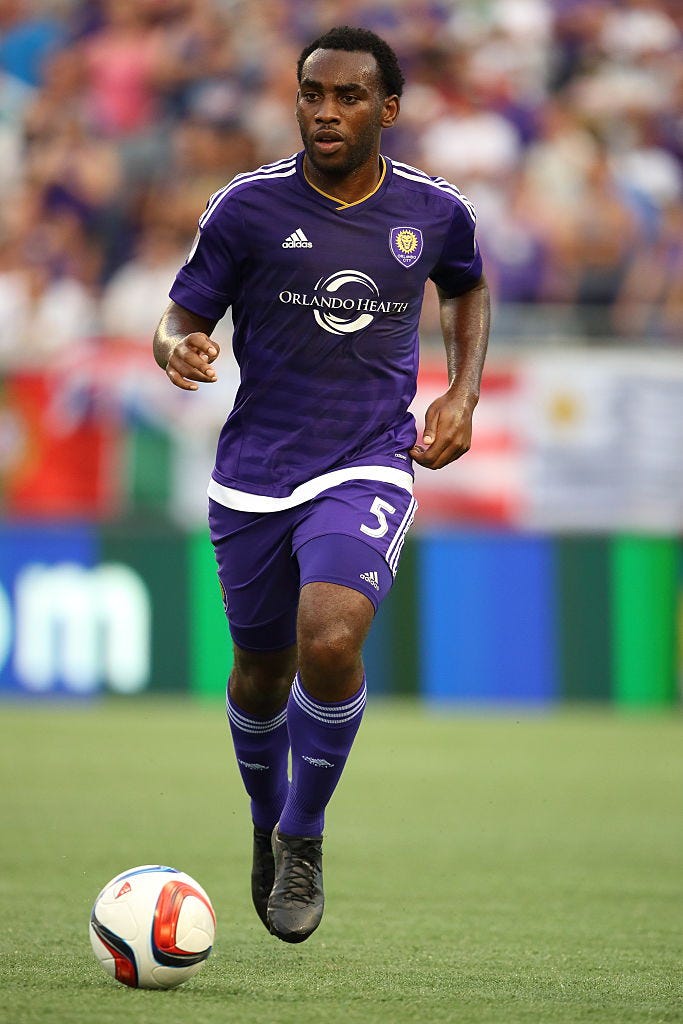How Not to Go Broke in Professional Sports
Amobi Okugo didn’t know how to manage his wealth. Now he’s teaching other athletes what he's learned.
Amobi Okugo had made it.
He was the sixth overall draft pick by the Philadelphia Union after his freshman season at UCLA. As a rookie in 2010, he made a guaranteed salary of $158,000, per the MLSPU’s annual disclosures. That may or may not have included signing and game bonuses—who knows, Major League Soccer’s finances are opaque.
As the 18-year-old son of Nigerian immigrants, he understood full well that he had been given a precious head start in life. Sure enough, by the 2016 season, his best-paid in the league, his base salary had risen to $300,000 and his guaranteed income was $325,000.
That kind of money launched him into the middle class of professional sports. He was now among the many athletes who make more than enough money to get by, unlike scores of minor leaguers and fringe players, but don’t accumulate the kind of generational, headline-grabbing wealth you see at the top end of sports. The overwhelming majority of professional athletes, after all, don’t make the kind of money that allows the recipient to retire from work of any kind just as soon as their playing days are done.
As such, that income requires careful management. Yet it isn’t enough to sustain a top-notch team of financial advisors tasked with growing and investing the pile in the way that Kevin Durant and Alex Rodriguez, say, have managed to parlay their salaries into well-diversified portfolios of assets.
Okugo knew enough to grasp that he was a well-off young man. But he had no concept of how to handle his money, other than to be careful with it. His paycheck, while more than ample for a teenager, didn’t leave him with much room for error if he wished to stay well-off throughout his adult life.
Inspired by ESPN’s 30 for 30 documentary “Broke,” which explored how 60 percent of NBA players go broke within 5 years of retiring and 78 percent of NFL players are in financial distress within 2 years, he went looking for financial role models within sports.
“It was more of a research project,” Okugo recalls. But all he could find were the quasi-billionaire success stories and the cautionary tales. So he began seeking out athletes who seemed to have their finances in good order and interviewed them on how they did it. Then he started A Frugal Athlete, a blog on the same subject that has since grown into a website, a podcast and a business providing guidance, workshops and courses to college and early-career athletes.
Okugo finished his bachelor’s degree in organizational leadership, with a minor in business administration, at the University of Louisville and then got a master’s in sports law at the University of Arizona. Now, he and his small team provide the kind of guidance he couldn’t seem to find himself.
To be clear, they don’t offer financial advice. But they impart the things Okugo has learned by talking to financially savvy athletes on building and monetizing brands, structuring personal finances, avoiding rookie mistakes, strategizing budgets and creating secondary income streams. He gives a monthly workshop to the student-athletes at Concordia University in Austin, Texas, where Okugo now plays for the Austin Bold, a second-tier team he has represented since 2019. He has also given talks at the Big East conference, UCLA and at MLS’s annual rookie symposium. In all, Okugo has addressed more than 500 college and early-career athletes, his target demographic.
“Unfortunately, in most cases we can’t use our sports salaries to live until we’re 80,” he says. “As athletes, we’re so focused on earned incomed based on our performance. But how can we use our stature to make more money, whether it’s through training, appearances, speaking engagements, branding, investments? That’s what the skill is. And different ways to be more efficient and frugal.”
He stresses that athletes meet their own financial needs first. “You can’t drink from an empty cup,” he says. “And a lot of times athletes, because we’re in a unique opportunity to help family and friends, you become the provider or you’re emotionally blackmailed if you make it without helping.”
Because no matter how much an athlete actually makes, it is assumed that they have vast disposable income. “That’s a big misconception,” Okugo says. “Yes, we’re on TV and get a lot of perks and benefits. But in terms of kicking your feet up and chilling and being on a beach somewhere after you’re done playing, that’s rarely the case. So how can you leverage the fact that you are making a good amount of capital in these unique years?”
That means adjusting for an inverted earning curve. Most people work their way up to their prime earning years in their 50s and 60s, with their expenses growing accordingly. Athletes tend to have their biggest earning years in their 20s and 30s and rarely reach those peaks again, even though their financial responsibilities tend to grow as they age.
“How can you leverage that head start so that you’re not in that situation that a lot of athletes face when they’re done playing: financial instability, which leads to other stuff—anxiety, high divorce rates, a lot of things that don’t get talked about enough,” Okugo says.
He figures the trick is in making the most of the privileged opportunities athletes get to make extra money, like the chance to invest in restricted products or ventures. But you have to be educated to take advantage. “LeBron James has a whole team behind him looking at deals,” says Okugo. “You may be getting deals at a different level but you’re looking at it on your own. There’s a mismatch there. So how can you have at least as much information as possible to ask the right questions?”
That’s what A Frugal Athlete hopes to offer: a foundation of knowledge and the right things to ask. So that you might make the most of your money, the way Okugo appears to have done for himself.
“I’m doing alright,” the 30-year-old says of his own finances. “I can’t retire when I’m done playing. But I’m taking a little bit of my own advice and I can be good for a little bit.”
Soccer miscellany:
















